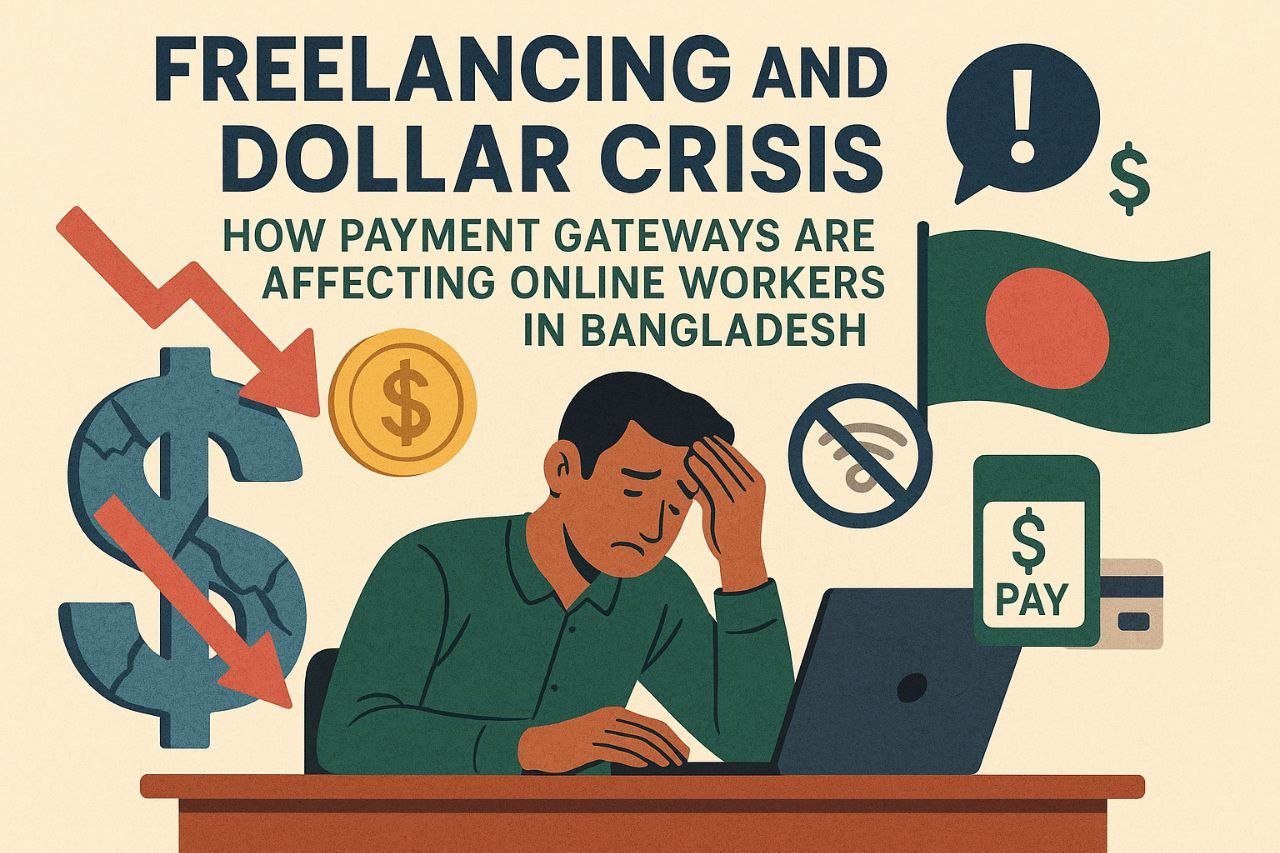Freelancing and Dollar Crisis: How Payment Gateways Are Affecting Online Workers in Bangladesh

Freelancing in Bangladesh: Impact of Dollar Crisis & Payment Gateways
The freelancing landscape in Bangladesh has witnessed tremendous growth in recent years, with thousands of online workers offering their services globally. The country has emerged as one of the top destinations for outsourcing due to the availability of skilled labor at competitive prices. According to a report by the World Bank, Bangladesh has one of the highest numbers of online freelancers in South Asia, contributing significantly to the country’s digital economy. However, a major challenge for these freelancers has surfaced in the form of the dollar crisis and the way payment gateways are functioning.
As the U.S. dollar has been experiencing a volatile trend, the effects of this currency fluctuation have impacted Bangladeshi freelancers who rely on the dollar as their primary income source. This article will delve into how the dollar crisis is affecting online workers in Bangladesh, focusing on payment gateways, and the challenges they face in terms of exchange rates, fees, and payment access.
The Freelance Economy in Bangladesh
Freelancing has become a primary income source for many in Bangladesh, especially in the digital sectors. Freelancers in the country are working for global clients across various fields, such as graphic design, writing, software development, translation, and digital marketing. According to the Bangladesh Association of Software and Information Services (BASIS), over 600,000 freelancers in Bangladesh were earning from international clients in 2021, with the total annual revenue generated from the freelance sector estimated at over $1 billion.
The rise of online platforms such as Upwork, Fiverr, and Freelancer has given Bangladeshi freelancers access to a global market, offering flexibility and financial independence. Despite these opportunities, freelancers are facing unique challenges due to economic factors such as the dollar crisis, affecting their earnings and payment processes.

The Dollar Crisis: A Looming Concern
The dollar crisis in Bangladesh refers to a situation where the value of the U.S. dollar rises significantly compared to the Bangladeshi Taka (BDT), leading to a shortage of foreign exchange reserves. This has led to increased pressure on businesses and individuals who rely on the dollar for international transactions.
For freelancers in Bangladesh, the dollar crisis has posed significant financial challenges. Many of them rely on payments made in USD for their services. However, as the dollar continues to appreciate, they find themselves receiving less value for the money once it is converted into their local currency. For instance, in the past few years, the exchange rate between the U.S. dollar and the Bangladeshi Taka has become unfavorable, resulting in a devaluation of the local currency. As of early 2023, the exchange rate has hovered around 1 USD = 110 BDT, compared to approximately 84 BDT in 2015. This depreciation has created a ripple effect in the freelance economy, reducing the purchasing power of freelancers’ earnings.
How Payment Gateways Are Affected
Payment gateways are crucial intermediaries in facilitating cross-border transactions, allowing freelancers to receive their earnings from international clients. Popular platforms such as PayPal, Payoneer, and Skrill are widely used by freelancers in Bangladesh to access payments. However, these gateways are not without their issues, especially in a dollar crisis context.
PayPal: Limited Access and High Conversion Fees
PayPal is one of the most widely used payment gateways in the world. However, its lack of full availability in Bangladesh has been a major drawback for local freelancers. Although some workarounds exist, the lack of direct integration between PayPal and Bangladeshi banks has led to difficulties in withdrawing funds. As a result, freelancers must rely on third-party services to access their payments, which often leads to higher transaction costs.

Additionally, PayPal charges a currency conversion fee when funds are withdrawn in Bangladeshi Taka. This means that freelancers not only lose value due to the unfavorable exchange rates but also face additional fees for converting their dollars into BDT. These hidden costs erode a significant portion of freelancers’ earnings, leading to frustration among workers who feel they are not adequately compensated for their efforts.
Payoneer: Higher Fees and Slow Withdrawal Process
Another popular payment gateway in Bangladesh is Payoneer, which allows freelancers to receive payments from global clients and withdraw funds to their local bank accounts. Payoneer offers relatively low conversion fees compared to PayPal, but it is not without its drawbacks. For instance, Payoneer charges a withdrawal fee when transferring funds from the Payoneer account to a local bank. Additionally, the exchange rate provided by Payoneer can be unfavorable, which means freelancers lose more money during conversion.
Furthermore, the withdrawal process through Payoneer can take several days, depending on the bank’s processing time. During this time, fluctuations in the dollar’s value could further reduce the freelancers’ earnings when converted to BDT. This delay, combined with high withdrawal fees, creates significant financial strain for online workers who rely on timely payments for day-to-day expenses.
Skrill: Limited Usage and Expensive Fees
Skrill is another payment platform used by freelancers, particularly for international transfers. However, Skrill has not gained widespread popularity in Bangladesh due to its high transaction fees and the lack of widespread adoption among local businesses. Moreover, similar to PayPal and Payoneer, Skrill charges hefty fees for currency conversions, which significantly cuts into freelancers’ earnings.
The fact that Skrill is not as widely accepted in Bangladesh as PayPal or Payoneer limits its usefulness for many freelancers. While it is useful for receiving payments from clients in certain industries, it is still not as reliable for freelancers who require flexible, low-fee solutions for their international payments.
The Vicious Cycle of Currency Depreciation
The combination of an appreciating dollar and the high transaction costs of payment gateways creates a vicious cycle for Bangladeshi freelancers. As the value of the dollar increases, their local currency loses value, reducing the overall amount they take home after conversion. This leaves freelancers with less money to cover their daily living expenses, pay bills, or save for the future.
For example, a freelance designer who charges $500 for a project may find that after the currency conversion and transaction fees, they only receive the equivalent of $400 or less in BDT. In the context of rising inflation and economic instability, this scenario makes it increasingly difficult for freelancers to maintain a decent standard of living.
Exploring Solutions to Mitigate the Impact
While the dollar crisis and payment gateway issues pose significant challenges for Bangladeshi freelancers, there are several ways to mitigate these effects:
Alternative Payment Methods: Some freelancers in Bangladesh are turning to alternative payment methods such as cryptocurrencies. Bitcoin and Ethereum offer an option for cross-border payments with relatively lower fees and fewer intermediary charges. Although the volatility of cryptocurrencies is a concern, they provide freelancers with more control over their earnings.
Diversifying Client Base: Freelancers can look to diversify their client base to reduce reliance on U.S.-based clients. Targeting clients from countries with stronger currencies, such as the European Union or Australia, can help offset the effects of currency depreciation. By doing so, freelancers can earn payments in more stable currencies, mitigating the risks of dollar fluctuations.
Negotiate Better Rates: Given the increasing costs associated with the dollar crisis and payment gateway fees, freelancers can negotiate higher rates with clients to account for the additional financial burdens they are facing. By factoring in the impact of exchange rates and transaction fees, freelancers can ensure they receive fair compensation for their work.
Use of Local Payment Solutions: Some local payment solutions, like bKash and Rocket, are gaining popularity in Bangladesh for facilitating digital transactions. While these platforms are primarily for domestic transfers, exploring ways to integrate them into international payment systems can provide a cost-effective alternative for freelancers.
The dollar crisis is having a significant impact on Bangladeshi freelancers, as currency depreciation and high fees associated with payment gateways are eroding their earnings. Freelancers who were once able to leverage their skills to earn global income are now faced with the challenge of currency fluctuations and costly transaction fees. However, by exploring alternative payment methods, diversifying their client base, and negotiating better rates, freelancers can take proactive steps to ensure financial stability.
As Bangladesh continues to strengthen its position in the global freelancing economy, addressing the issues related to the dollar crisis and payment gateway inefficiencies will be crucial for supporting the country’s freelancers. By implementing effective solutions, Bangladesh can create a more sustainable and rewarding environment for online workers in the years to come.
Looking for more ways to earn money as a student? Check out our article on Top 10 Income Ideas for Students to Earn Money Easily for some great ideas!







